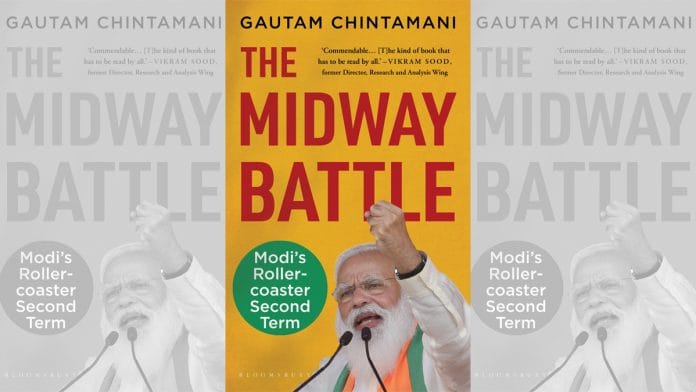New Delhi: Ever since India’s independence, every government has promised to transform agricultural laws and give more power to farmers but each attempt has faced major opposition, a new book analysing the Narendra Modi government’s second term has argued.
Published by Bloomsbury India, The Midway Battle: Modi’s Roller-Coaster Second Term by Gautam Chintamani will be released on 12 October on ‘Softcover’, ThePrint’s online venue to release select non-fiction books.
Divided into three sections, the book focuses on the run-up to the 2019 Lok Sabha elections, the BJP’s victory and the role of the opposition, and on several events that took place over the course of 2019 until 2021, culminating in the second wave of the Covid-19 pandemic.
In the prologue, however, Chintamani is primarily concerned with the fallout of the farmer protests since September 2020, and provides some background on agricultural reforms in India.
As part of his argument that previous central governments have had unsuccessful attempts at implementing transformative farm laws, Chintamani cites the setting up of the National Commission of Farmers (NCF) under the Vajpayee government in 2003.
“[The NCF was] a pathbreaking body that would look into problems of farmers and suggest solutions to improve farm income and the standard of living of farm households,” he says.
Chintamani goes on to talk of the UPA government’s 2006 appointment of geneticist M.S. Swaminathan, who had played an important role in India’s Green Revolution decades prior.
“Unfortunately, in the decade that followed, for some reason or the other, the government did not or was unable to act upon most of these recommendations,” Chintamani writes.
CAA, India’s response to Covid pandemic
Other issues covered in the book include the 2019-20 protests related to the Citizenship Amendment Act (CAA), and India’s response to the Covid-19 pandemic under PM Modi.
However, despite the impact of the protests on India’s image and the effects of the ongoing Covid-19, India is now a “significant player” on the global stage, Chintamani argues.
“India is well on its way to charting its new place in the world, notwithstanding challenges, criticism and opposition, both at home and abroad,” he writes.
A film historian and grandson of Telugu poet laureate Arudra and feminist writer K. Ramalakshmi, Gautam Chintamani is an author and film historian who has previously written on Rajnath Singh, Rajesh Khanna, as well as the films Pink and Qayamat Se Qayamat Tak.
Also read: New book underlines quality, effectiveness of India’s healthcare system






